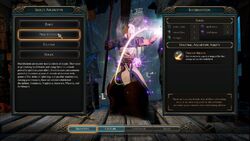Nothing: What Bethesda learnt from Oblivion
Nothing: What Bethesda learnt from Oblivion
Interview - posted by DarkUnderlord on Sat 5 July 2008, 05:19:57
Tags: Fallout 3There's an interview up with Pete Hines over on IGN AU. It's all about learning from Oblivion and how that helps them make Fallout 3:
IGN AU: What did you learn from making Oblivion? What didn't work?
Pete Hines: There's no giant 'we can't ever do that again' stuff.Hello, level-scaling encounters so that you're attacked by poor bandits wearing glass armour? Or how about using the same 5 voice-over artists to record everyone's voice and then mix and matching their voices during dialogue with a single character? Any of that ring a bell for stuff that, you know, you just might want to totally avoid next time? No...?
It's more how do we design quests, what kind of choices do we let the player make, how do we account for things we think the player might try and do and anticipate those? So that they're like 'Oh, I wonder what happens when I do this?' And then there's actually something in the game that acknowledges it and takes it into account. And they go 'that's really cool that I got to finish this quest in a really unique way and the game recognised that and gave me a satisfying response.'
In Oblivion the most extreme example is the bandits, who's armour keeps going up and up as you're playing through the game. Suddenly they've got glass armour and amazing weapons. It was an obvious thing that didn't feel right.Oh, right. It was an "obvious thing" and yet... they missed it and put it in the game anyway. Erm... Okay. Sure you're not just saying that because everyone told you it was a dumb idea after the fact and you're just trying to spin it so you don't look completely daft?
We definitely spent more time on third-person as a real, viable, 'play the whole game in this way' mode. And it is becoming more popular – the third-person, over the shoulder. I definitely think it's a much more playable, viable option than before.U-huh. Didn't they say that about Oblivion too?
IGN AU: How do the choices you make about whether you play as a good guy or a bad guy affect the game?
Pete Hines: I don't think there are enormous differences.Go on. Read the rest. You know you want to.
Spotted @ GameBanshee
IGN AU: What did you learn from making Oblivion? What didn't work?
Pete Hines: There's no giant 'we can't ever do that again' stuff.
It's more how do we design quests, what kind of choices do we let the player make, how do we account for things we think the player might try and do and anticipate those? So that they're like 'Oh, I wonder what happens when I do this?' And then there's actually something in the game that acknowledges it and takes it into account. And they go 'that's really cool that I got to finish this quest in a really unique way and the game recognised that and gave me a satisfying response.'
In Oblivion the most extreme example is the bandits, who's armour keeps going up and up as you're playing through the game. Suddenly they've got glass armour and amazing weapons. It was an obvious thing that didn't feel right.
We definitely spent more time on third-person as a real, viable, 'play the whole game in this way' mode. And it is becoming more popular – the third-person, over the shoulder. I definitely think it's a much more playable, viable option than before.
IGN AU: How do the choices you make about whether you play as a good guy or a bad guy affect the game?
Pete Hines: I don't think there are enormous differences.
Spotted @ GameBanshee
There are 14 comments on Nothing: What Bethesda learnt from Oblivion














